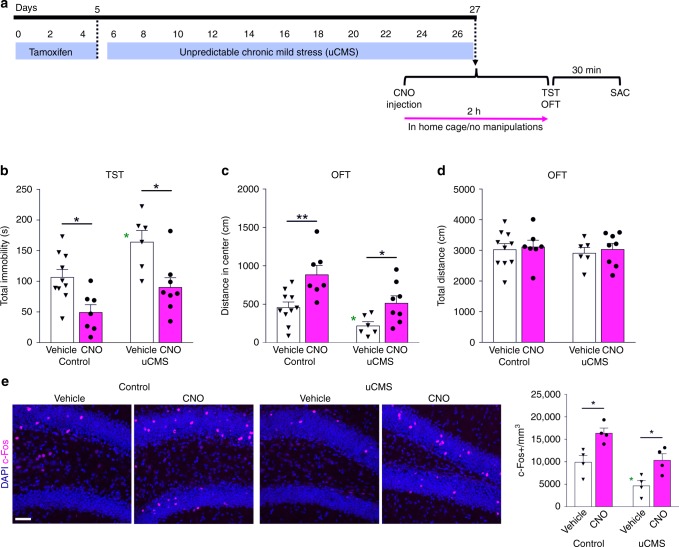Fig. 5.
Acute activation of newborn dentate gyrus neurons reverses the behavioral effects of unpredictable chronic mild stress (uCMS). a Timeline representing the experimental design for determining whether acutely enhancing the activity of newborn neurons in adult hippocampus reverses the behavioral effects of unpredictable chronic mild stress (uCMS) in Ascl1-CreERTM;R26LSL−hM3Dq mice. b Total time-spent immobile in tail suspension test, a measure of depression-like behavior (uCMS F1,27 = 11.23, **P = 0.002; CNO F1,27 = 19.93, ***P = 0.0001; Interaction F1,27 = 0.313, P = 0.581; Tukey posthoc test Control + Vehicle versus uCMS + Vehicle *P < 0.05). c Center exploration distance in open-field test, a measure of anxiety-like behavior (uCMS F1,27 = 12.1, **P = 0.002; CNO F1,27 = 17.04, ***P = 0.0003; Interaction F1,27 = 0.564, P = 0.459; Tukey posthoc test Control + Vehicle versus uCMS + Vehicle *P < 0.05). d Total distance in open-field test, measure of locomotor activity (uCMS F1,27 = 0.242, P = 0.627; CNO F1,27 = 0.267, P = 0.609; Interaction F1,27 = 0.008, P = 0.930). e Representative images and quantification of c-Fos expression in the dentate gyrus (uCMS F1,12 = 19.19, ***P = 0.0009; CNO F1,12 = 22.01, ***P = 0.0005; Interaction F1,12 = 0.088, P = 0.771; Tukey posthoc test Control + Vehicle versus uCMS + Vehicle *P < 0.05). Data are presented as means ± s.e.m. and analyzed by two-way ANOVA. Scale bar 50 μm

